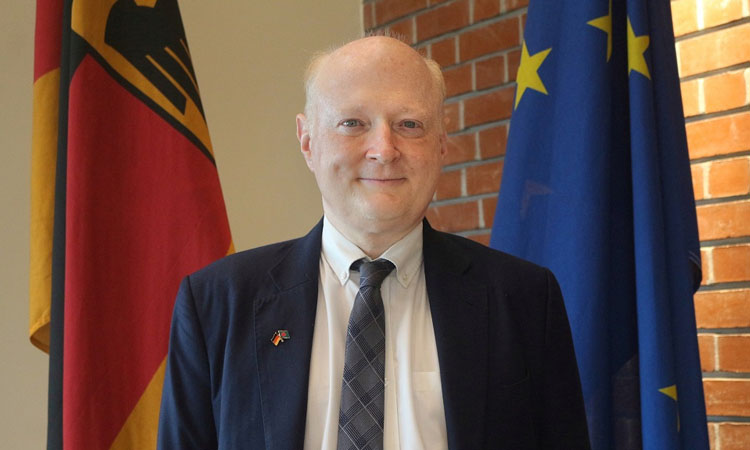News Flash

DHAKA, Nov 26, 2025 (BSS) – German Ambassador to Bangladesh Dr Rüdiger Lotz today said Germany wants Bangladesh’s upcoming national election to be held in a free, fair and participatory manner.
He laid emphasis that citizens must vote without obstruction and political parties must be able to contest freely in a peaceful, intimidation-free environment.
“When we say free, fair, and participatory elections, we mean that citizens must be able to take part in the process without obstruction, men and women alike and that multiple political parties should be able to contest,” he said.
The ambassador was speaking at the DCAB Talk organised by the Diplomatic Correspondents Association, Bangladesh (DCAB) at the National Press Club here.
The Ambassador elaborated on what Germany and the European Union mean by participatory elections.
He added that participation also requires a peaceful and non-violent campaign environment, space for peaceful political expression, and an electoral process in which votes are counted accurately and transparently.
A high voter turnout, he said, would be a critical sign of public trust. Referring to Chief Adviser Professor Muhammad Yunus’s earlier statement, the Ambassador noted that a turnout of around 60 percent would be a “reasonable and positive benchmark.”
The envoy said the European Union was likely to send a large election observer mission, reflecting both Bangladesh’s strategic importance and the international community’s expectation for credible polls.
“You will have our support,” he added, noting that his early engagement with Bangladeshis from political and business leaders to ordinary citizens had shown him how deeply democratic values are rooted in the country.
“People are open and willing to express their views. That shows the strength of democratic roots.”
Turning to domestic political matters, the Ambassador said Bangladesh ultimately needed a long-term process of national reconciliation.
He noted that such dialogue had been missing for many years.
“What the country needs, in the long run or even the short run, is a process of national reconciliation, a dialogue that brings the country together,” he said.
Reconciliation, he added, required willingness from all sides, including an acknowledgement from former leaders about “what went profoundly wrong.”
He suggested that the moment for initiating such dialogue might emerge after the election, when political actors would need to focus on unity and institutional reform.
He also stressed that political parties must remain committed to the reform agenda launched after the events of August 2024.
“This reform process is key for the country’s future,” he said, noting that Germany and other European partners would continue to encourage Bangladesh to stay the course.
Responding to questions on the trial of deposed prime minister Sheikh Hasina, the envoy said, past abuses of power, he added, is necessary after major political transitions, but such processes must respect due process, rule-of-law principles, and lawful standards.
The Ambassador also addressed economic issues, noting that Bangladesh’s decision regarding the purchase of Airbus aircraft from France could influence the overall climate of bilateral and European economic relations.
A decision on aircraft purchase could have an impact, not necessarily severe consequences, but certainly an effect on the overall atmosphere of bilateral economic relations, he said.
Germany, as Bangladesh’s largest trading partner in Europe, valued reliability in major business decisions, he added.
On student visas, Ambassador Lotz said demand for studying in Germany was rising, but the processing of applications was being slowed by a considerable number of falsified or incorrect documents.
“This delays the process for everyone, including genuine students,” he said, assuring that efforts were underway to expedite legitimate applications.
DCAB President AKM Moinuddin and General Secretary Md Arifuzzaman Mamun also spoke at the event.